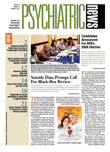Professionals who provide or manage mental health services, including substance abuse services, in New Orleans and Baton Rouge are seeing a marked increase in the number of individuals with major depression, anxiety disorders, posttraumatic stress disorder (PTSD), and addiction disorders two years after the region was devastated by Hurricane Katrina.
Those were among the findings of a survey conducted by the National Council for Community Behavioral Healthcare (NCCBH). NCCBH is a not-for-profit association representing 1,300 mental health and addictions treatment organizations in the United States.
“We know that the crisis has worsened for many affected by Hurricane Katrina, in particular those experiencing mental health and addiction disorders,” said Linda Rosenberg, M.S.W., president and CEO of the NCCBH, in a statement released with the survey results. “While state officials in Louisiana say they don't need additional funding for mental health and addiction services, we are not seeing the impact of the dollars they claim to have. We still don't have adequate staff and resources to meet this overwhelming human need.”
The survey was conducted online August 9 to 20. Individuals asked to respond to the survey were in the Baton Rouge and New Orleans areas and identified through the member lists of organizations such as the Louisiana Psychiatric Association, Louisiana Psychological Association, Jefferson Parish Human Service Authority, Louisiana Department of Health and Hospitals, and the NCCBH. Of the 921 individuals contacted, 161 responded, for a response rate of 17.5 percent.
Respondents said they were battling a lack of adequate staffing and facilities at the same time that demand for services has increased. More than half said that additional staff is needed to share heavy workloads.
Respondents also explained that challenging living and working conditions have significantly increased their own frustrations and ability to deal with the workload; one-half of respondents cited “lack of livable infrastructure” as a major challenge. For example, many reported that that they have not been able to rebuild their own homes, and some are still living and working out of FEMA trailers.
Questions on the survey covered such topics as changes in patient caseload, increases or decreases in specific mental health and addiction disorders, and satisfaction with working in the profession following Hurricane Katrina. Here are some of the survey findings:
•
93 percent of respondents said they have seen an increase in the number of PTSD cases, 84 percent cited an increase in cases of general anxiety disorder, and 63 percent cited an increase in cases of panic disorder.
•
91 percent said they have seen an increase in the number of people with major depression.
•
83 percent said they have seen an increase in the number of people with substance-related disorders.
•
68 percent said they have seen an increase in the number of people with sleep-related disorders.
•
33 percent said they have seen an increase in the number of people with schizophrenia and other psychotic disorders.
The report, “Two Years After Katrina: A Survey of Mental Health and Addiction Providers in New Orleans and Baton Rouge, Louisiana,” is posted at<www.nccbh.org>.▪
